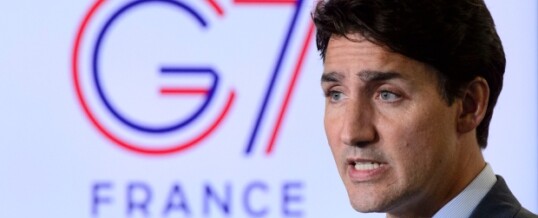
McLeod Group guest blog by Julia Tops and David Manocchio, September 3, 2019
Under Prime Minister Justin Trudeau, Canada took a progressive feminist approach to G7 global governance. However, while seeking to tackle gender-based inequalities, Canada failed to sufficiently address the environmental dimensions of inequality. This narrow focus limited the space available to promote inclusive growth and combat inequality, the theme of this year’s G7 Summit in Biarritz, France. If the goal of prosperous and equitable societies is to be achieved, Canada needs to incorporate all dimensions of sustainable development.
In recent years, G7 discussions have been increasingly influenced by the United Nations 2030 Agenda for Sustainable Development. The agenda’s framework provides a long-term path for all countries towards shared prosperity and sustainability for both humanity and the planet. It also recognizes that solutions to tackle social, economic and environmental issues are interconnected and must be addressed simultaneously.
Sustainable development incorporates various important dimensions of global governance. However, the G7 Summits in Charlevoix and Biarritz primarily focused on the social and economic pillars of the Sustainable Development Goals (SDGs), as prescribed in the 2030 Agenda.
For example, in Charlevoix, G7 leaders supported proposals to blend public and private financing for innovative solutions and inclusive economic growth. In Biarritz, they announced their support for the Affirmative Finance Action for Women in Africa (AFAWA), led by the African Development Bank, which aims to transform the banking and financial landscape for women entrepreneurs in Africa.Overall, through these initiatives, the G7 leaders agreed to a comprehensive policy framework to eliminate poverty, promote decent work and economic growth, and end gender inequality.
Meanwhile, G7 leaders were less ambitious on climate action as part of the environmental dimension of sustainable development. They did discuss creating low carbon societies, through institutions such as the International Development Finance Club, the multilateral development banks, and the Carbon Neutrality Coalition. Additionally, several G7 countries, including Canada, announced contributions of over US$5.5 billion to help replenish the Green Climate Fund, and $22 million towards fighting the Amazon Rainforest wildfires.
Nonetheless, leaders failed to tackle environmental issues through comprehensive initiatives. Of note, there were no agreed-upon actions that aimed to promote efficient, reliable and green energy, or to meet individual countries’ climate goals. The failure to sufficiently tackle the underlying environmental implications of inequality, the theme of France’s presidency, undermines the summit’s success.
Although Canada spearheaded the discussion on financing gendered development in 2018, which was replicated under the AFAWA initiative this year, Trudeau missed the opportunity to broaden G7 members’ actions to address the ecological dimensions of sustainable development. This is not to say that Canada is solely responsible for the outcomes of the G7 summits. For instance, U.S. President Donald Trump decided not to attend discussions on climate change and biodiversity, and on the Amazon Rainforest wildfires. But Canada’s failure to push for substantial reform contributed to inadequate attention to environmental sustainability.
Environmental and socioeconomic issues are not mutually exclusive, but rather interconnected, as they jointly reinforce other areas of societal development. Canada should therefore promote a policy that incorporates attention to gender-based inequalities with the issues of ecological justice, responsible production and consumption patterns, and clean energy. In doing so, Canada should build upon its previous efforts and reference specific SDG commitments to broaden the G7’s engagement.
Reflecting on the Biarritz Summit, Canada’s contribution to international development plateaued after its ambitious agenda as host in 2018. Canada needed to embrace a more progressive route by implementing integrated and targeted commitments. However, Trudeau kept his “status quo” contribution and lost momentum after Charlevoix.
The 2030 Agenda is not merely ambitious but necessary to combat inequality and ensure prosperity for all. Canada can still champion development, both globally and domestically, by pushing beyond its successful gendered approach and setting a continued pattern of action for holistic development at future G7 summits.
Julia Tops is the Co-Chair of Summit Studies for the G7 Research Group and Compliance Director of the G20 Research Group. David Manocchio is a Compliance Director and Analyst for the G7, G20, and BRICS Research Groups. Photo: The Canadian Press/Sean Kilpatrick.
